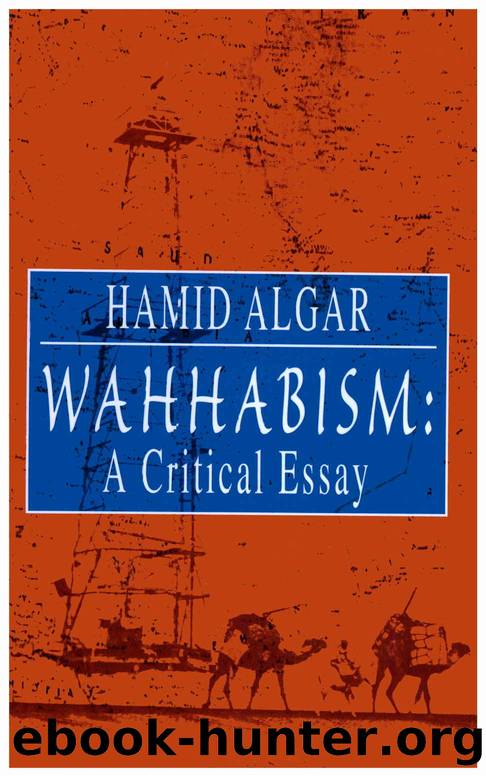Wahhabism: A Critical Essay by Hamid Algar

Author:Hamid Algar [Algar, Hamid]
Language: eng
Format: epub
Publisher: BookBaby
Published: 2015-08-04T07:00:00+00:00
V
It will be abundantly clear to the attentive reader by now that the present writer has little liking or sympathy for Wahhabism. He would therefore like to offer the following clarificatory remarks by way of conclusion.
First, it is a matter of common Muslim experience that Wahhabis and those under their influence have been liberal with accusations of shirk and bidâa for many years. This deplorable practice has now been inverted. Individuals with dubious credentials and motives who have appointed themselves upholders of Ahl al-Sunna wa al-Jamaâa (âmoderate,â âmainline,â and âtraditionalâ are some of the attributes with which they seek to adorn themselves) charge with Wahhabism all who do not subscribe to their views on politics and religion. It is significant that in their eagerness to win the favor of certain circles these professional anti-Wahhabis charge with Wahhabism particularly those Muslims for whom the cause of Palestine remains a high priority. No doubt the Salafi mode of thought has many adherents, and no doubt it has points in common with Wahhabism, as suggested above. However, it is inaccurate, irresponsible, and dangerousâparticularly in the climate of post-September 11 Americaâto conflate âSalafiâ with âWahhabiâ and paint a picture of American Muslims as being in their majority Wahhabi.63
Second, the critical attention now being paid to Wahhabism in the West proceeds largely from two sources: outrage that those responsible for the crimes of September 11 came, for the most part, from a Wahhabi background; and annoyance that Wahhabi activists and preachers have increasingly prevented the Saudi regime from fulfilling to complete satisfaction its allotted role in American schemes for political and military domination of the Middle East. The first of these is entirely legitimate; the second, less so. The current heightened awareness of Wahhabism comes also in the context of an open-ended American war against a terrorism that insofar as it is defined at all is something ascribed only to Muslim persons, organizations, or states. This war is being waged in concert with allies such as Russia, its hands bloodied with the Muslims of Chechnya; China, that has taken advantage of the opportunity to oppress with greater ferocity than before the Muslims of Eastern Turkistan [Sinkiang]; and Uzbekistan, where praying in a mosque can lead to years of imprisonment and torture. Worse still, it comes at a time of intensified genocidal rampaging in Palestine by the Zionists with the full backing of the United States.
Apart from noting with disgust the repugnant endorsement by certain Wahhabis of the atrocity commited against the innocent in New York on September 11, the authorâs primary intention is unconnected to the present conjuncture. What has inspired this essay, first drafted more than a year ago, is rather a concern that the Wahhabis have seriously distorted fundamental teachings of Islam; functioned for many decades as the ideological mainstay of a regime that has squandered the wealth of the Arabian peninsula; vilified Muslims, both Sunni and Shiâi, as non-Muslim and shed their blood; introduced or exacerbated division and strife wherever they have
Download
This site does not store any files on its server. We only index and link to content provided by other sites. Please contact the content providers to delete copyright contents if any and email us, we'll remove relevant links or contents immediately.
| Africa | Americas |
| Arctic & Antarctica | Asia |
| Australia & Oceania | Europe |
| Middle East | Russia |
| United States | World |
| Ancient Civilizations | Military |
| Historical Study & Educational Resources |
Never by Ken Follett(2869)
The Man Who Died Twice by Richard Osman(2289)
Machine Learning at Scale with H2O by Gregory Keys | David Whiting(2263)
Fairy Tale by Stephen King(2058)
Will by Will Smith(2032)
Rationality by Steven Pinker(1759)
The Dawn of Everything: A New History of Humanity by David Graeber & David Wengrow(1564)
The Dark Hours by Michael Connelly(1562)
Principles for Dealing With the Changing World Order: Why Nations Succeed and Fail by Ray Dalio(1368)
Friends, Lovers, and the Big Terrible Thing by Matthew Perry(1321)
A Short History of War by Jeremy Black(1295)
HBR's 10 Must Reads 2022 by Harvard Business Review(1251)
Go Tell the Bees That I Am Gone by Diana Gabaldon(1231)
Can't Hurt Me: Master Your Mind and Defy the Odds - Clean Edition by David Goggins(1218)
515945210 by Unknown(1205)
Fear No Evil by James Patterson(1105)
443319537 by Unknown(1069)
Works by Richard Wright(1017)
Going There by Katie Couric(987)
